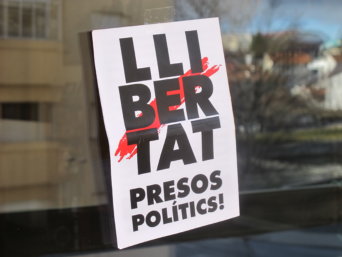- About
- Topics
- Picks
- Audio
- Story
- In-Depth
- Opinion
- News
- Donate
- Signup for our newsletterOur Editors' Best Picks.Send
Read, Debate: Engage.
| located: | Spain |
|---|---|
| editor: | Maria João Morais |
This Christmas, Catalonia was awash and adorned with the colour yellow, a symbol of solidarity with the Catalan political prisoners who are spending the festive season in Spanish jails.
Thousands of Catalans have protested the unjust situation of former Vice-President of the Catalan government, Oriol Junqueras, former adviser Joaquin Forn, and the two independence leaders Jordi Cuixart and Jordi Sánchez, in an aim to show their support to those incarcerated by displaying ribbons, scarves or any piece of clothing in the colour yellow. Despite the public demonstrations, the release of the independence leaders, currently facing potential sentences of up to 30 years for the crime of rebellion, seems far from becoming a reality. On the contrary, they could soon be joined by other separatist leaders, including the sacked president Carles Puigdmont, currently exiled in Brussels.
Regardless of fierce criticism, the Spanish Government continues to reject the tag of "political prisoners", claiming that they are simply "imprisoned politicians". Nevertheless, for most Catalans it is well known that Junqueras and his comrades were pre-emptively arrested not for committing crimes, but for their political ideas. They claim that if Spain admits the existence of political parties and organisations with an ideology of independence, it cannot prosecute those who pursue this conviction.
As justification for the preventive detention, the Spanish Public Prosecutor pointed to an "explosion of violence" committed by the accused. However, this standpoint is barely defensible, given the peaceful nature that has characterised the independence movement in recent years. In stark contrast, the Spanish state reacted to the referendum that took place on October 1st through excessive police violence that injured more than 800 people who simply wished to cast their vote at the ballot box.
At the same time, the conservative government boasts that Mariano Rajoy has "decapitated" the Catalan independentist parties. The statement by Vice-President Soraya Sáenz de Santamaría reveals the Spanish Government’s tight grip on the courts, calling into question the crucial separation of powers from the rule of law. More worryingly, the terminology used by the ruling right-wing Popular Party has been previously associated with ETA, the separatist Basque group, similarly described as "decapitated" when their military leaders were sent to jail. It is highly inappropriate for the Spanish Government to blur the lines between the peaceful Catalan movement with terrorist attacks carried out by ETA during its bloody, decades-long struggle for Basque independence.
Whether or not there is vast support for Catalan independence, the legitimate right to pursue this political objective should not be repressed by Rajoy’s central government, which echoes the dark times of the Franco dictatorship. Methods used by independence leaders could be questionable, as they advanced unilaterally without popular support exceeding 50% of Catalans. However, the consequences of their actions should be limited to political and non-judicial spheres.
By punishing those heading the independence project, Madrid is also criminalising the ideas shared among about 2 million Catalans. Therefore, instead of pursuing criminal proceedings, the Spanish State should listen to the demands of the Catalans who, in the elections held on December 21, gave another absolute majority to the independentist parties.
If the central government wishes to keep Catalonia within the Spanish state and calm down the constitutional crisis, they must take the path of dialogue and negotiation in order to ensure the continuation of coexistence, tolerance and peace in Catalan and Spanish societies.
